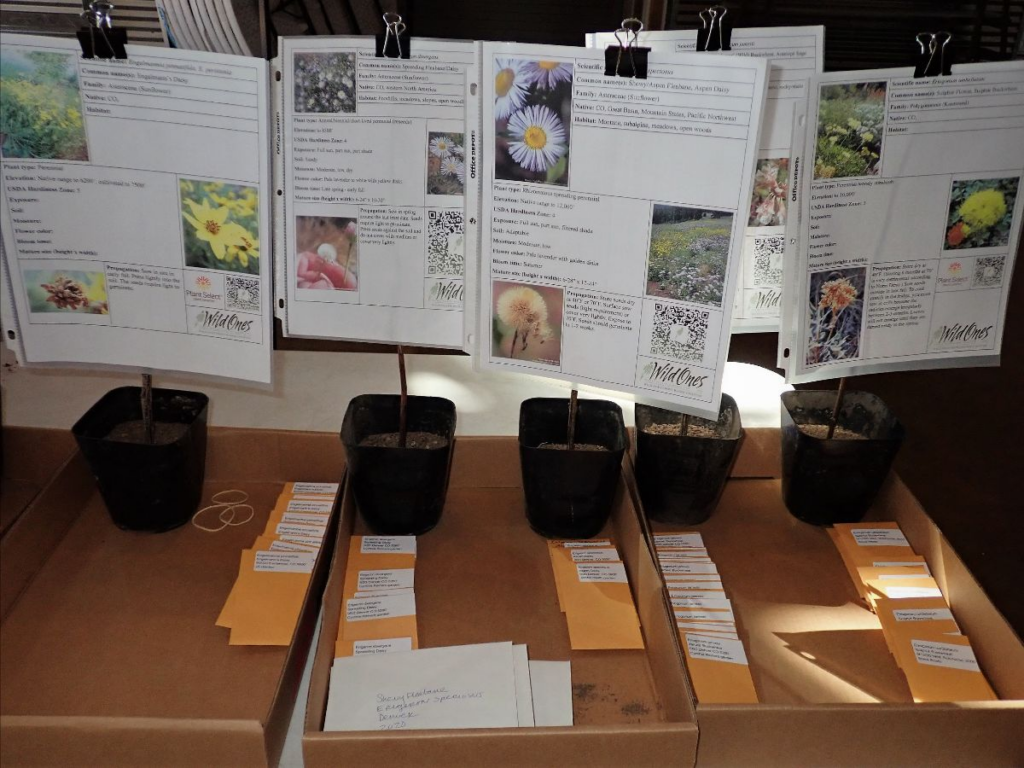by Lisa Olsen
Native Seed Swaps are essentially pay-it-forward events. Free and open to the public, the Swaps invite novice and seasoned gardeners to adopt more native plants into their gardens and return their bounty of seeds to support our growing native landscaping community. It was very rewarding to see so many (and especially so many new) people interested in boosting biodiversity in their gardens by planting native plants!
Our recent Native Seed Swaps in Denver (10/04) and Fort Collins (10/24) were a resounding success! Combined, volunteers stuffed and labeled over 4300 envelopes with seeds from over 85 species of native plants, including annuals, perennials, shrubs and grasses. The vast majority of the seeds were collected from home gardens. The Asteraceae or Sunflower family was well-represented: not only are plants in this family favorites of our native pollinators and birds, but many are also very easy to collect seeds from. We had an ample supply of Prairie Coneflower (Ratibida columnifera), an easy-to-grow and easy-to-collect sun-loving perennial highlighted in this short video.

Native Seed Swaps increase access to regionally adapted native seeds. The more seeds that we collect from our gardens, the less we have to rely on collecting in the wild. Wild collecting often requires permits, deprives wildlife of forage, and depletes seed stores in areas that may be impacted by fire in the future. Due to the vast areas of land in need of restoration as a result of this year’s devastating fires, land managers will lose access to prime seed collection sites, and demand for commercially available seeds will be very high. For individual gardeners, seeds collected in urban and suburban gardens may be our best and most reliable source moving forward.

Native Seed Swaps provide an opportunity for Wild Ones members to serve the broader community. Members and supporters collected seeds, offered up their gardens for other members to collect seeds, cleaned, packaged and labeled seeds, and staffed the Swaps, answering attendees’ questions about how to grow each species. A HUGE thank you is due to Jan Midgley, who cleaned and (with the help of her partner Dean) packaged the majority of the seeds for the Denver Swap and researched and compiled the Native Seed Germination Guide. Please refer to the Guide for tips on how to grow the species that were available at the Swaps. Thanks to Cynthia Reiners for stepping in at the last minute to help with labeling, packaging and organizing for the Denver Swap, and thanks to so many other volunteers who pitched in to pull these events together. Much gratitude is due to our generous seed donors — too numerous to name; without your support there would be no seeds to swap! The Native Plant Data Sheets are generated by Lisa Olsen, and will be uploaded to the Wild Ones website as they are completed.

With the help of our partners — People and Pollinators Action Network, Wildlands Restoration Volunteers, Fort Collins Nature in the City, and the Northern Colorado Chapter of the Colorado Native Plant Society — we were able to extend our reach north and host our first NOCO (northern Colorado) Native Seed Swap in Fort Collins; our plans include expanding to Colorado Springs in 2021. If you are interested in volunteering to help organize a Swap in the Springs (or to assist with next year’s Denver or NOCO Swaps), please connect with us via email. To learn more about Native Seed Swaps and watch a video on seed collecting and cleaning techniques, please visit our website.
Curious to learn more about transforming your garden into a habitat with Colorado native wildflowers, grasses, shrubs, and trees? Check out our native gardening toolkit, register for an upcoming event, subscribe to our newsletter, and/or become a member – if you’re not one already!
